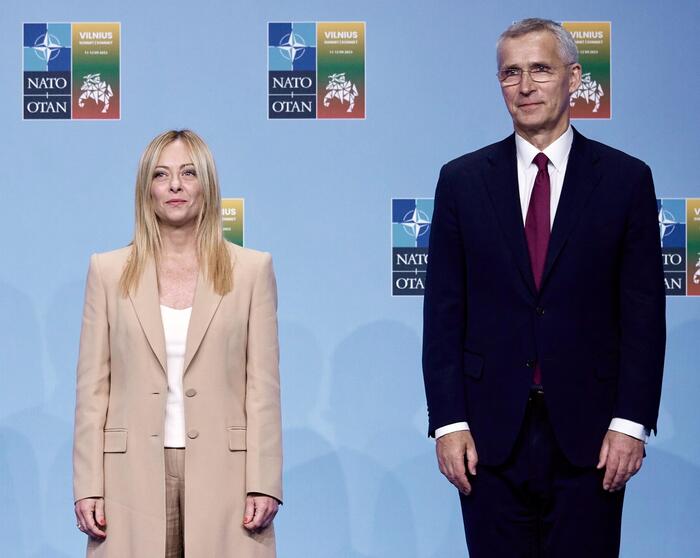Meloni's NATO Strategy: A United Front for Europe?
Giorgia Meloni, Italy's Prime Minister, has embarked on a significant reshaping of Italy's role within NATO, promising a stronger, more unified European front. Her approach, however, is complex and faces considerable challenges, sparking debate about its long-term effectiveness. This article delves into the key aspects of Meloni's NATO strategy, analyzing its potential benefits and drawbacks.
Strengthening the Southern Flank: A Focus on the Mediterranean
Meloni's strategy places significant emphasis on bolstering NATO's presence in the Mediterranean, a region increasingly volatile due to geopolitical tensions and migration flows. This focus involves:
- Increased Military Spending: Italy, under Meloni's leadership, has committed to increasing its defense budget, aligning with NATO's target of 2% of GDP. This investment aims to modernize its armed forces and enhance its contribution to collective security.
- Enhanced Cooperation with North African Allies: Meloni's government has prioritized strengthening ties with key North African partners to address shared security challenges, including counter-terrorism and migration management. This involves diplomatic initiatives and increased military cooperation.
- Strengthening Naval Presence: Italy is expanding its naval capabilities in the Mediterranean, focusing on maritime surveillance and counter-piracy operations. This is crucial for protecting its interests and contributing to regional stability.
Challenges in the Mediterranean Approach
While the focus on the Mediterranean is commendable, several challenges remain:
- Balancing competing interests: Navigating the complex dynamics between European powers, North African nations, and other regional actors requires deft diplomacy and a nuanced understanding of the political landscape.
- Resource constraints: Even with increased defense spending, Italy faces resource limitations that could hinder the ambitious scope of its Mediterranean strategy.
- Internal political pressures: Meloni's government needs to effectively manage domestic political pressures, ensuring sufficient public and parliamentary support for its ambitious security initiatives.
A Transatlantic Partnership: Navigating the US-Europe Relationship
Meloni has repeatedly affirmed her commitment to the transatlantic partnership and close cooperation with the United States. This involves:
- Support for Ukraine: Italy, under Meloni's leadership, has been a strong supporter of Ukraine in its conflict with Russia, providing both military and humanitarian aid.
- Shared intelligence: Enhanced intelligence sharing and joint military exercises with the US are pivotal to Meloni’s strategy, strengthening the collective defense capabilities of both nations.
- Technological Cooperation: Italy is pursuing closer technological cooperation with the US, particularly in areas such as defense technology and cybersecurity.
Navigating EU-US Tensions
The close relationship with the US also requires navigating the sometimes delicate relationship between the US and the European Union. Finding the right balance between transatlantic cooperation and EU autonomy remains a key challenge.
The European Dimension: A More Integrated Approach?
Meloni's NATO strategy also aims to promote greater European integration in defense matters. This involves:
- Strengthening EU defense capabilities: Italy supports increased investment in the European Defence Fund and the development of a stronger European defense industry.
- Closer cooperation with EU partners: Meloni advocates for closer cooperation with other EU member states within NATO, particularly on issues relating to the Mediterranean and Eastern flank.
- Promoting European strategic autonomy: Balancing close transatlantic ties with the pursuit of European strategic autonomy is a complex task that demands careful consideration.
Obstacles to Greater European Integration
Achieving greater European integration in defense remains a formidable task, hampered by:
- National interests: Individual member states often prioritize national interests, making it difficult to reach consensus on common defense policies.
- Differing security priorities: EU members hold varying perceptions regarding major security threats, which can complicate the development of joint strategies.
- Bureaucratic hurdles: The EU's complex decision-making processes can slow down progress on defense initiatives.
Conclusion: A Work in Progress
Meloni's NATO strategy presents a vision of a more assertive, proactive Italy playing a central role in European and transatlantic security. While her approach offers potential benefits, it faces significant challenges related to resource allocation, geopolitical complexities, and the need for greater European integration. The success of her strategy will hinge on her ability to navigate these complexities and garner sufficient support both domestically and internationally. Only time will tell if Meloni’s vision of a united European front within NATO can become a reality.
Keywords: Giorgia Meloni, NATO, Italy, European Security, Mediterranean Strategy, Transatlantic Relations, European Defence, Ukraine Conflict, Defense Spending, Geopolitics, Military Cooperation, Security Challenges.
